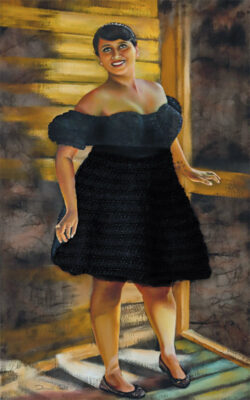The Aplomb Project
Aplomb, Dover, NH • aplombgallery.com • Ongoing

In the midst of the COVID-19 pandemic, portraitist Danielle Festa painted the first in an ongoing series of portraits depicting trauma survivors, a series now known as The Aplomb Project. What started as a personal project has grown into a gallery space, a non-profit organization and an international community of survivors and supporters with Festa at the center.
Festa takes inspiration from classic works of portraiture, chosen by the people she paints. Her subjects are given a voice throughout the process. They make playlists for her to listen to and choose colors used in the piece. Part of what makes The Aplomb Project so unique and personal is that, after the portraits are exhibited, they are gifted back to the subjects. “This is going to end up on their walls, and it’s supposed to be a reminder of their strength, so it makes sense that they would have a lot of input.”
The survivors choose their own, often visually arresting, outfits. “The importance of what a survivor wears is really critical to their own feeling of self-worth and their newfound confidence matches their exterior,” said Festa, who incorporates textiles into her work, allowing her subjects’ clothes to leap off the page. For Stitched Together (2024), the subject Sravya K crocheted her own dress, and gave Festa a piece of the dense black knitwear to use in the work.
Festa is conscious of potentially triggering content while still encouraging survivors to share their stories. In the gallery, the survivors’ stories are located on a small screen, and visitors can choose to read them or not. Festa hosts workshops at her gallery in Dover where attendees engage in artmaking with the guidance of experts under a model of trauma-informed care.
In a world that too often shies away from even saying words like rape, incest and sexual abuse, perpetuating the shadowy culture of silence and denial in which these atrocities thrive, Festa’s work shines a light into that darkness. Yet, despite the nature of these topics, it is not through violent imagery that Festa reaches her audience. Instead, Festa invites us to the conversation through lovingly crafted depictions of survivors, standing proud, with aplomb.
— Autumn Duke
